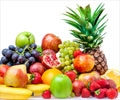Fruit and vegetable consumption among the hemodialysis population is low. However, a higher intake of fruits and vegetables can lower the risk of early death in dialysis patients.
- Fruit and vegetable consumption among dialysis patients is low
- However, increasing fruit and vegetable intake lowers the risk of early death in dialysis patients
Read More..
A team led by Giovanni Strippoli, MD, PhD, (Diaverum AB, Sweden and the University of Bari, Italy) Valeria Saglimbene, MScMed, and Germaine Wong, MBBS, PhD (University of Sydney School of Public Health, in Australia) designed a study to evaluate the association of fruit and vegetable intake with all-cause, cardiovascular, and non-cardiovascular mortality among adults treated with hemodialysis.
"Although diet is a key component of self-management and provides an important opportunity for a collaborative approach between patients and healthcare professionals to improve care, there is limited evidence on the impact of diet on patient-relevant outcomes," said Dr. Saglimbene.
In the study of 8,078 hemodialysis patients who completed food frequency questionnaires, only 4% of patients consumed at least 4 servings of fruits and vegetables per day as recommended in the general population.
The team noted that there were 2,082 deaths (954 from cardiovascular causes) over a median follow-up of 2.7 years. Compared with patients who had 0-5.5 servings of combined fruits and vegetables per week, those who had 5.6-10 servings and those who had more than 10 servings had 10% and 20% lower risks of dying from any cause, respectively, as well as 12% and 23% lower risks of dying from non-cardiovascular causes.
In an accompanying editorial, Ranjani Moorthi, MD, MPH, MS (Indiana University) noted that the findings may spur future studies.
Source-Eurekalert
















